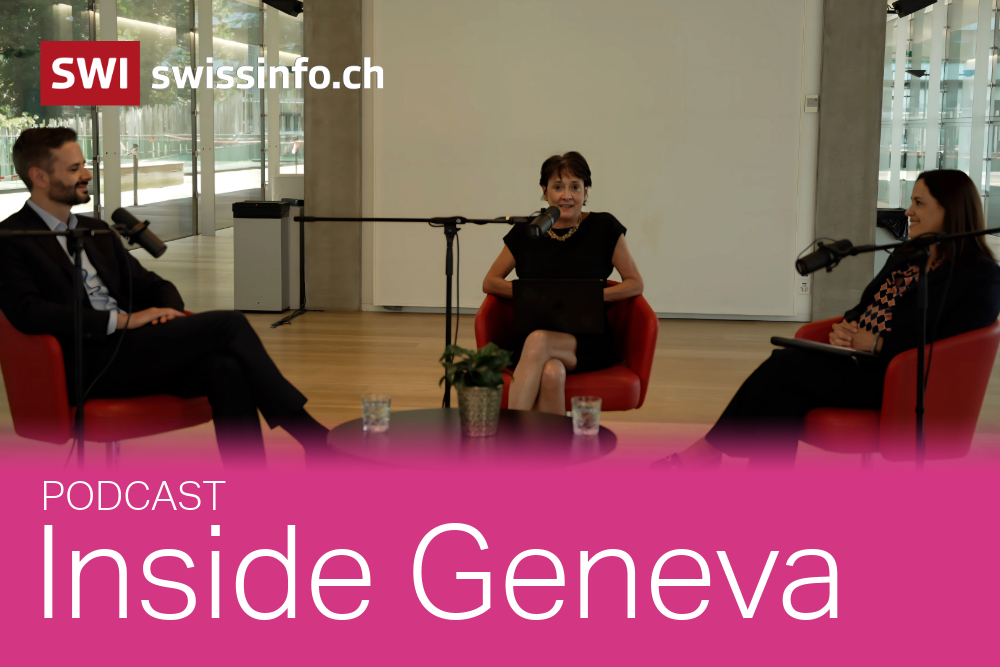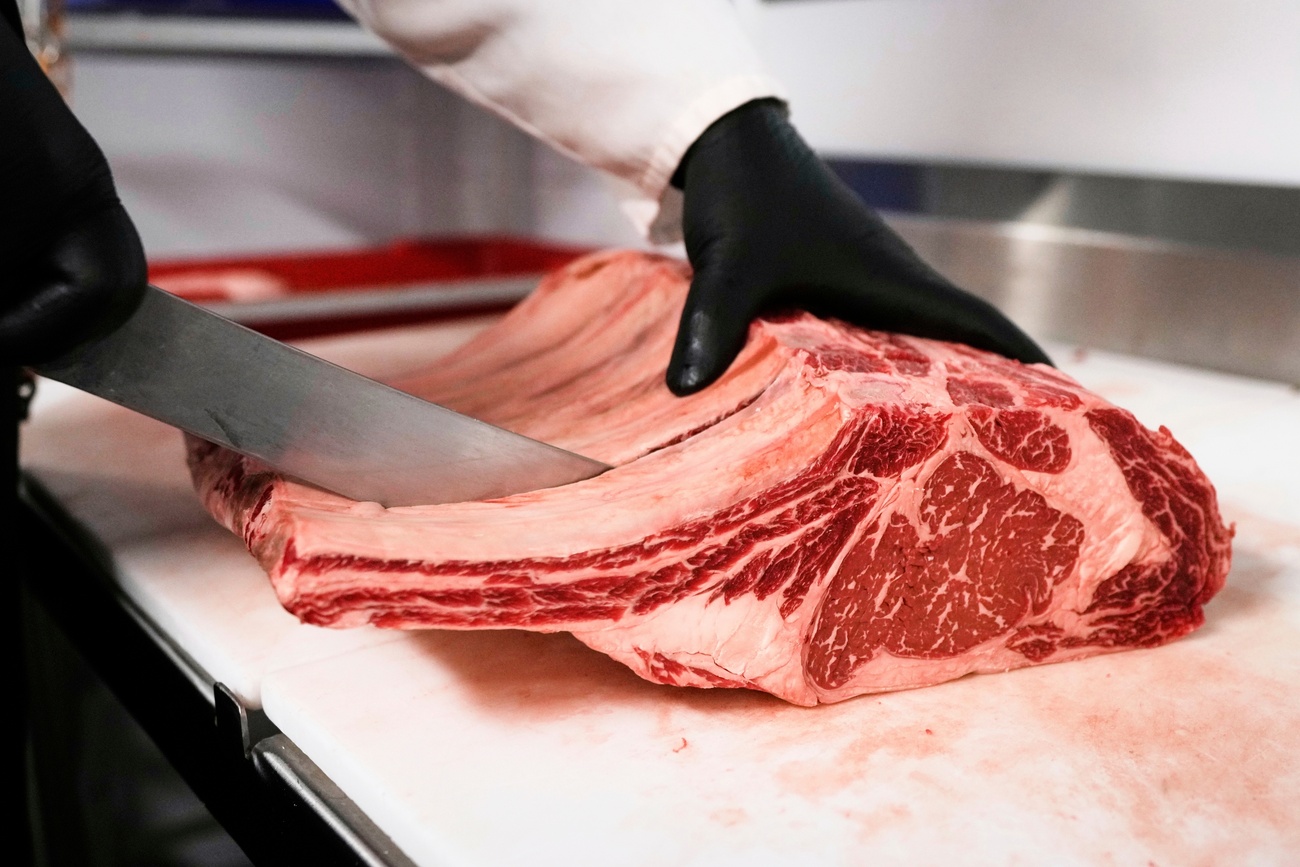
The WTO, global trade, and why we need ‘re-globalisation’
Regular listeners to our Inside Geneva podcast will know that our focus is very often on the humanitarian side of international Geneva – human rights, refugees and migration, humanitarian aid in conflict zones, global health crises, etc. But there is another Geneva based institution that also plays a global role: the World Trade Organisation.
When I first started as a journalist in Geneva, the WTO was regularly on our radar. The Doha Development talks appeared to be a positive, ambitious but workable route to make global trade fairer, and allow low income countries to benefit. I was there during those hot July days in Geneva 2008 when the deal foundered on the rocks of national interests, never to be properly revived.
Since then, WTO negotiations have not been quite so intense. Global summits with history making agreements on the agenda have been replaced by incremental progress, and some obstruction – not least United States blocking of the WTO’s appellate body, which allows countries to file complaints against each other if they believe trade rules are being violated. Or it did, until the United States decided to block the appointment of new judges, meaning all seven seats on the appellate body are now empty.
So what does the WTO do nowadays? Is it still even relevant? This week in Geneva the WTO is holding its public forum, and, ahead of that, Inside Geneva was able to sit down with WTO deputy director Johanna Hill, and chief economist Ralph Ossa.
More
Inside Geneva: can the WTO shape a fairer world economy?

So what does it do?
Since it’s a while since I had a really long hard look at the WTO, the first thing I wanted to know was what exactly it does. With 164 members (soon to be 166 when Comoros and Timor-Leste join) the WTO aims to make trade fair for all, bringing the smallest nations, and the biggest, into one organisation where who sells what, how, and to whom are discussed and, sometimes, regulated.
As we all know, there are big disagreements: the US and the European Union locked horns over subsidies to aviation giants Boeing and Airbus. Another big row, this time with China over electric vehicles, is looming. But there are also successes. As Ralph Ossa tells Inside Geneva, “trade has been a very powerful force for reducing between country inequality. Since 1995, since the foundation of the WTO, extreme poverty in the world has been reduced from 40% to 10%, because of growth in many countries that was also export led.”
And Johanna Hill emphasises that while big WTO agreements (or lack thereof) may not be making headlines at the moment, less high profile strategies are paying off. “At the WTO our members have gotten together, and many of them have formed a working group on trade and gender, to especially put the lens of women on trade policy and to see what more can be done so that they can take advantage of opportunities.”
Digital trade is an area where she sees more isolated regions or groups doing well. The market in online accessible education, accounting, and other services is flourishing. But it depends, of course, on having access to the internet, something some of the world’s poorest regions and communities still don’t have.
Trade for a better world?
What’s particularly interesting about this year’s World Trade Report, out this week and being presented at the WTO public forum, is its focus on other challenges facing the planet, and its suggestion that more inclusive, and fairer, trade – “re-globalisation” – could help solve them.
Climate change is one. The report suggests that countries should work to reduce greenhouse gas emissions, and that trade could even help with this. How exactly? Ossa suggests looking at the equation somewhat differently. Accept that we do need to reduce greenhouse gas emissions, imagine a “worldwide carbon tax”, there would be a huge boost in the trade of environmental technologies, “so trade is an important force multiplier for climate policies.”
The problem for many of us, reading this, is that we know all too well how introverted many nation states are becoming, how little enthusiasm they show nowadays to multilateral strategies to improve our planet. That’s why, says Hill, it’s so important for the WTO to encourage its members to discuss this.
“Nobody questions the importance of regulating to protect the environment or to protect health. Everybody agrees on that. It’s the how that might be the question.”
And to those who think the WTO has the power to dictate policy, really its history of the last few years must show that is clearly not the case. Like the UN, it’s a body made up of members, who must agree policy together. Going back to the example of supporting more women to grow businesses and access export markets, Ossa says a key value of the WTO is the shared learning experience it can provide.
‘‘Perhaps one member is going to say well, you know, having supported women in my country, it has been really such a tremendous success. Because now we see higher growth rates, lower poverty rates and so on. Why don’t you try it yourself?”
So, listeners, if you’ve been wondering what the WTO is up to nowadays, or if you’re coming to it for the first time and want to know what’s it all about, join us on Inside Geneva for an in-depth and informative discussion.
Edited by Virginie Mangin

In compliance with the JTI standards
More: SWI swissinfo.ch certified by the Journalism Trust Initiative





























You can find an overview of ongoing debates with our journalists here . Please join us!
If you want to start a conversation about a topic raised in this article or want to report factual errors, email us at english@swissinfo.ch.